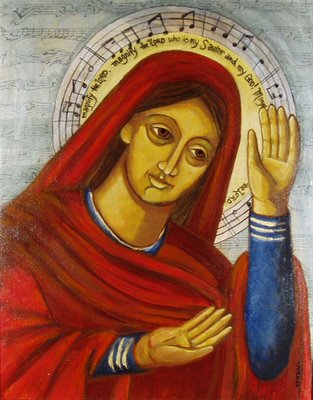“The starving poor sat down to a banquet; the callous rich were left out in the cold.” –Mary
Growing up Catholic at a time in my country when “Communist Priest” was easily pointed at any clergy who showed compassion for the poor, the Magnificat in Luke 1 was often read only until verse 51–you know, the well-behaved Mary. The more radical Mother or our Lord; ‘Miriam’ which in Hebrew means “Rebellion,” the one celebrating that the poor had been saved and the rich been left with nothing, was kindly shushed. Apparently, communist deities were not popular in 1980’s Chile.
The season of advent is subject to a similar neutering. The idea of Christmas in the social imaginary seems to lack any narrative of resistance. It is no wonder Dr. Cornell West astutely speaks of the “Santa Clausified Martin Luther King Jr,” or Jesus, represented as, ‘Deodorized, manicured, sterilized.’ And yet today we desperately need the eschatological hope of the coming of Emmanuel.
Instead, we co-opt this Christian hope as a Santa-Clausified notion of advent under the name of “Christmas.” This pseudo-religious overarching narrative lacks any eschatological imagination, making it not only irrelevant but also cruel in light of the current struggle of communities of color in the U.S.
The holiday cheer makes the stomach cringe in the face of the grand jury rulings in Ferguson and Staten Island, combined with the constant deportation and detention of members of our communities. Once again the carefree message of the holiday standards–cozy blankets and hot cocoa–, stands in stark contrast with the daily lives of so many in the US. This dissonance has been painful; like a knot in the throat. Millions join in with Eric Garner’s lament–We cannot breathe, we say.
The pain all around has challenged me with the question: How do we hope? How do we hope for the coming of Emmanuel when some find no respite from social oppression? How do we celebrate Emmanuel’s coming when there is no relief? When our parents and loved ones are still detained despite our tireless efforts to set them free? When our boys are killed with impunity by an unrepentant system?
More specifically, how do we, as a people of the cross, hope with integrity in the tension of advent?
Going back to our dearly rebellious Mary, her context seems fitting to our question. Mary was not only a pariah given her status as pregnant out of wedlock; she was also a member of the oppressed people living under the domain of the Roman Empire and as such, she might have been desperate for transformation. The news of the Messiah sounded overwhelming and good because they’d have an impact in her sociopolitical context. It was relevant, important, potentially transformative. There was hope in the midst of sociopolitical hardship and lament.
This tension of hope and lament seems to be the hermeneutical key to advent. We long for justice while we grieve its absence. We cry out for the coming of the Kingdom because we believe things should be different but have to deal with the harsh realities of broken systems.
Activists in the front lines of “La Lucha” are no strangers to this emotional ambivalence. Those protesting police brutality in New York share these feelings in common with those protesting migrant detention in the Pacific Northwest. We work heavy-hearted yet hopeful.
Our task then is to re-appropriate advent as a hope for transformation relevant to our sociopolitical context; drawing from it as the narrative that can carry us as a people through the adversity of the moment. The casting of a eschatological hope that brings us together in solidarity.
To this end, I find Amos Yong’s proposal promising. In his book Renewing Christian Theology: Systematics for a Global Christianity. Yong argues that “God has reconciled himself to the world in the incarnate, crucified, and risen Christ and by the Holy Spirit so that human beings can participate in the task of reconciling the world to God” p.7.
God has reconciled himself to the world in Jesus’ atonement. The Holy spirit makes it possible for humans to participate in the task of reconciliation. In this sense, the gift of God is to have made this reconciliation possible in Christ by taking the first step. Yet, in keeping with the intrinsically relational character of trinitarian [renewalist] theology, we are invited to participate in the completion of this process of reconciliation. God has made it possible, but he did not do our part for us. We have to do it together, as the body of the Church, through the holy spirit.
This means that we are on the hook to bring about justice and that we need the entire Church; the entire body, to do so. As Jesus prayed in John 17:22 “I have given them the glory that you gave me, that they may be one as we are one— 23 I in them and you in me—so that they may be brought to complete unity. Then the world will know that you sent me and have loved them even as you have loved me.”
Such call to transformative action may serve to the formulation of advent as the hopeful lament of a movement of resistance…the narrative that can carry us as a people crying out O Come, O Come Emmanuel…




Missio Alliance Comment Policy
The Missio Alliance Writing Collectives exist as a ministry of writing to resource theological practitioners for mission. From our Leading Voices to our regular Writing Team and those invited to publish with us as Community Voices, we are creating a space for thoughtful engagement of critical issues and questions facing the North American Church in God’s mission. This sort of thoughtful engagement is something that we seek to engender not only in our publishing, but in conversations that unfold as a result in the comment section of our articles.
Unfortunately, because of the relational distance introduced by online communication, “thoughtful engagement” and “comment sections” seldom go hand in hand. At the same time, censorship of comments by those who disagree with points made by authors, whose anger or limited perspective taints their words, or who simply feel the need to express their own opinion on a topic without any meaningful engagement with the article or comment in question can mask an important window into the true state of Christian discourse. As such, Missio Alliance sets forth the following suggestions for those who wish to engage in conversation around our writing:
1. Seek to understand the author’s intent.
If you disagree with something the an author said, consider framing your response as, “I hear you as saying _________. Am I understanding you correctly? If so, here’s why I disagree. _____________.
2. Seek to make your own voice heard.
We deeply desire and value the voice and perspective of our readers. However you may react to an article we publish or a fellow commenter, we encourage you to set forth that reaction is the most constructive way possible. Use your voice and perspective to move conversation forward rather than shut it down.
3. Share your story.
One of our favorite tenants is that “an enemy is someone whose story we haven’t heard.” Very often disagreements and rants are the result of people talking past rather than to one another. Everyone’s perspective is intimately bound up with their own stories – their contexts and experiences. We encourage you to couch your comments in whatever aspect of your own story might help others understand where you are coming from.
In view of those suggestions for shaping conversation on our site and in an effort to curate a hospitable space of open conversation, Missio Alliance may delete comments and/or ban users who show no regard for constructive engagement, especially those whose comments are easily construed as trolling, threatening, or abusive.